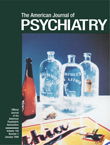Impact of Clozapine on Negative Symptoms and on the Deficit Syndrome in Refractory Schizophrenia
Abstract
OBJECTIVE: This study compared the effect of clozapine and haloperidol on positive and negative symptoms of schizophrenia and in patients with high levels of negative symptoms or the deficit syndrome. METHOD: Patients were participants in a 15-site double-blind, random-assignment Veterans Administration trial comparing clozapine (N=205) and haloperidol (N=217) in hospitalized patients with refractory schizophrenia. Analysis of covariance examining change at 6 weeks, 3 months, and 1 year evaluated 1) clozapine’s effect on positive and negative syndromes; 2) clozapine’s effect on each syndrome, statistically controlling for the other; and 3) the interaction of clozapine treatment and the presence or absence of high levels of negative symptoms at baseline and the deficit syndrome. RESULTS: Patients treated with clozapine showed significantly greater improvement than control subjects on positive symptoms at all time points and on negative symptoms at 3 months. Clozapine had no independent effect on negative symptoms at any time after control for positive symptoms, but its effects on positive symptoms persisted after control for negative symptoms at 6 weeks only. There were no significant differences in response to clozapine between patients with high and low levels of negative symptoms at baseline or between patients with and without the deficit syndrome. CONCLUSIONS: The greater effectiveness of clozapine as compared to conventional medications in refractory schizophrenia is not specific to either negative clinical symptoms or clinical subtypes defined by prominent negative symptoms or evidence of the deficit syndrome.



